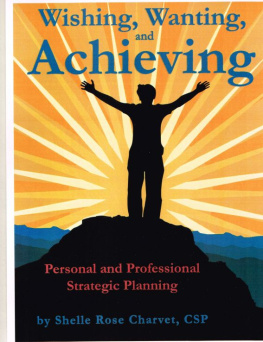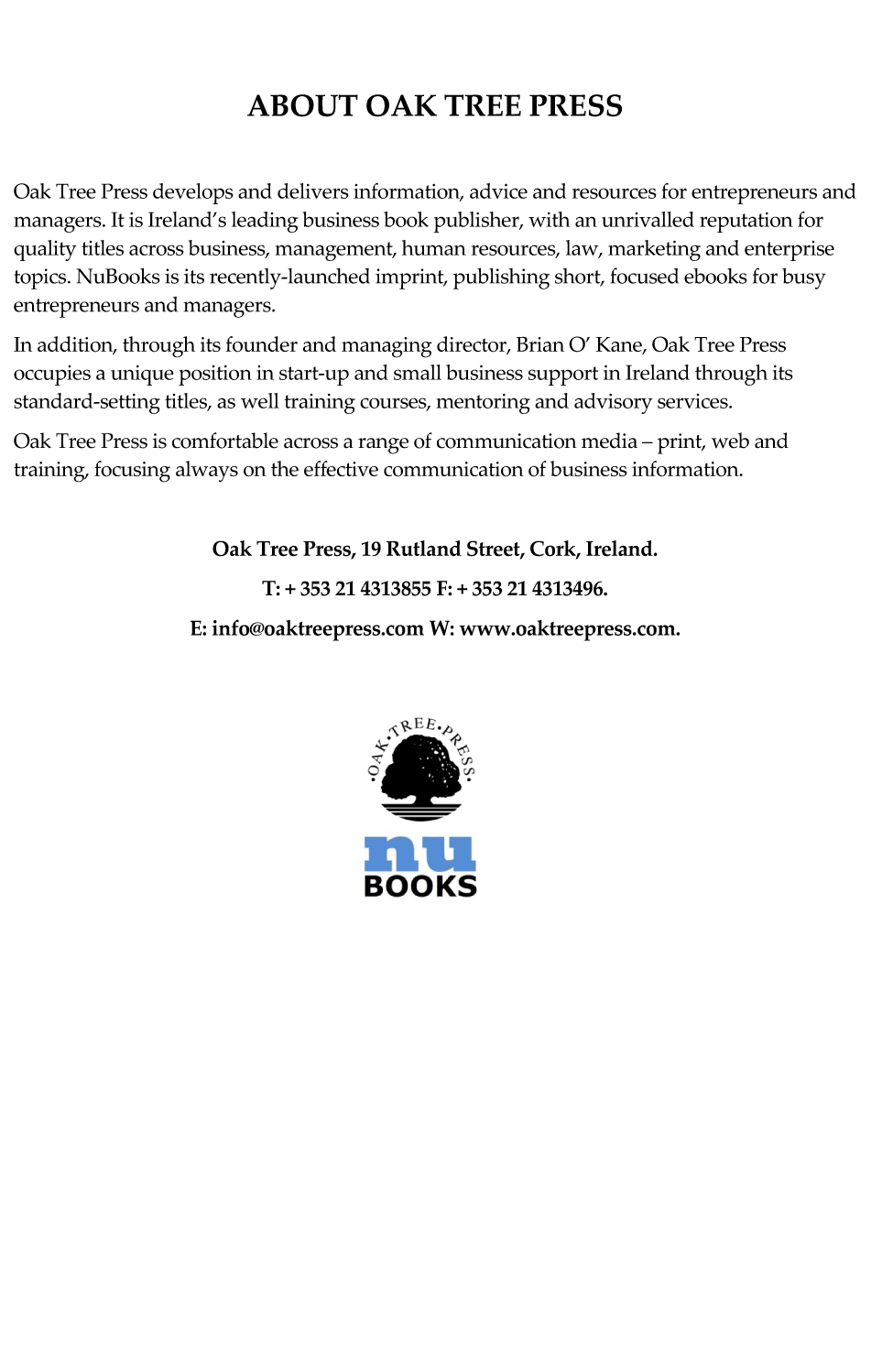ABOUT THE AUTHOR
Business advisor and coach, motivator and bestselling author Pearce Flannery is the founder of the acclaimed Pragmatica organisation. His seminars are renowned for delivering extraordinary performance. Through his unique range of corporate training solutions, Pearce has coached thousands of people and numbers many leading business personalities, sports figures and political leaders amongst his clients. His programmes are delivered in his inspirational, high-impact and motivational style and are guaranteed to challenge participants to drive the change required in pursuit of their goals.
To book Pearce Flannery for a seminar or corporate event, visit www.pearceflannery.com or call 00 353 91 770002.
NUBOOKS
Other NuBooks currently available include:
| 001 | Starting Your Business Brian O'Kane |
| 002 | Ask for the Order! Pearce Flannery |
| 003 | Marketing Basics Brian OKane |
| 004 | Are You an Entrepreneur? Brian O'Kane |
| 005 | Finding Business Ideas Brian O'Kane |
| 006 | Researching Business Ideas Brian O'Kane |
| 007 | Managing Your Time Tom McConalogue |
| 008 | Getting Things Done Dermot Duff |
| 009 | Managing Stress and Your Health Andrew McLaughlin |
| 010 | Planning Your Career Brian McIvor |
| 011 | Motivating Others Georgina Corscadden |
| 012 | Building Effective Teams John Power |
| 013 | Negotiating Effectively Kevin Davey |
| 014 | Facilitating Meetings and Chairing Discussions Julia Rowan |
| 015 | Managing People Martin Farrelly |
| 016 | Managing Customers Siobhan McAleer |
| 017 | Presentation and Communication Skills Lynda Byron |
| 018 | Internal Communications Tim Wray |
| 019 | Assertiveness Lynda Byron |
| 020 | Influencing Others Jill Stamp |
| 021 | Gathering Business Information John Cullen |
| 022 | Business Writing Mary Condren |
| 023 | Managing in Changing Times Tom McConalogue |
| 024 | Managing Outsourcing Deirdre Garvey |
| 025 | Doing Business Strategy Robert Galavan |
| 026 | Leadership Michael Shiel |
| 027 | Competitive Intelligence: The Key to Strategic Advantage - A Guide for Small Business Owners Carol Tallon |
| 028 | Becoming Lean: Practical Steps to Build Competitiveness Richard Keegan |
| 029 | Pre-Negotiation: A Strategy for Winning Carol Tallon |
| 030 | Wise Owl Says ... Business Quotations that Challenge, Motivate and Provoke Brian OKane |
1: INTRODUCTION TO STRATEGIC PLANNING
Working for someone else
Many of us entrepreneurs cut our teeth in the business world working for somebody else. We started our working lives in someone elses employment and learnt very quickly that we had certain obligations and responsibilities to our employer. We had a job to do and we were expected to do it. We either stepped up to the mark and performed to expectations or we were soon looking for employment once again. There were few, if any easy, rides.
When we were employed by someone else, invariably we had someone driving us, setting standards of performance, of conduct, of discipline and of achievement. In short, we had someone to answer to. We were accountable. We had someone overseeing our work who was ready, able and often much too willing to give us a good kick in the ass when we needed it and sometimes when we didnt!
This quickly made us realise that we had to put in continuous effort and achieve certain goals for the business, whatever they may have been. We had someone watching over us which, in itself, provided a motivation. This motivation may have been driven by fear but, nonetheless, it was motivation of a sort. We knew we had to perform, we knew that excuses did not count and we certainly knew we did not have the luxury of only working when we felt like it. We had to be at work at a certain time and we had to work hard because it was our job and because we did not have any choice in the matter. We had to deliver results. Work or be gone was the order of the day. It really was that simple!
Working for ourselves
When we started working for ourselves, we rarely had the luxury of having any staff, managers or even someone to bounce ideas off let alone to motivate us. Being self-employed or managing personal projects often can be a lonely and isolating experience. Now, more than ever, you need someone to drive and direct you but, very often, there is no one there. You are on your own and, without an understanding of planning and goal-setting, you can become stuck in a rut. Even a business with immense potential cannot and will not progress without a vision and without a plan to achieve that vision.
While writing my book Grabbing the Oyster (Oak Tree Press, 2009), I identified that the ability to work relentlessly toward the achievement of ones own goals and to remain focused on the job at hand were defining characteristics of successful businesspeople. In short, successful business people are able to kick their own asses! They knew that this is an essential part of creating the reality that they wanted. They decided they couldnt wait, so it was up to them to create the reality they desired. It is up to you to do likewise. For if it is not to be you, then who?
This is a personal question I recommend you keep with you and ask yourself every day of your life. If it is not to be me, then who is it to be?
Introducing planning and goal-setting
This ebook aims to introduce you to the dual concepts of strategic planning and goal-setting without indulging in much of the emotive rhetoric and academic exclusivity usually associated with such an exercise. It could be termed strategic planning made simple but that would be wrong.
While planning as a concept in itself is a simple exercise, its execution is often rather more difficult. Nonetheless, the implementation or execution of a plan can be simplified easily by breaking it down into its constituent parts and approaching the exercise as a series of steps.
Very often clever, articulate and driven people who, for one reason or another, may have found their business or themselves to be stuck in a rut see the solution as an immensely difficult project one beyond their control. This is because they fail to break down the task into a series of steps. To put it simply, they have stopped making progress because they fail to plan effectively.
This lack of progress invariably can be attributed to one of two things;
- A lack of clarity in their vision or goals, so that they are unsure as to what exactly is the endgame.
- An inability to plan effectively, implement that plan and achieve the goals involved.
My philosophy is straightforward. Have a clearly defined vision, get a plan and stick with it until it has been successfully implemented. Commitment and resolute focus to the task at hand is essential in the successful achievement of ones goals.









